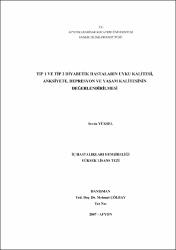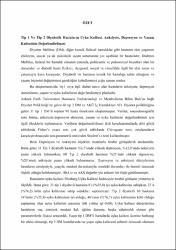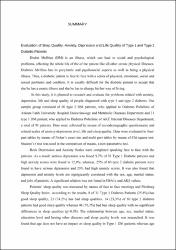| dc.contributor.advisor | Çölbay, Mehmet | |
| dc.contributor.author | Yüksel, Sevda | |
| dc.date.accessioned | 2015-05-14T10:56:48Z | |
| dc.date.available | 2015-05-14T10:56:48Z | |
| dc.date.issued | 2007 | |
| dc.date.submitted | 2007 | |
| dc.identifier.uri | http://hdl.handle.net/11630/4052 | |
| dc.description.abstract | Diyabet Mellitus (DM), diğer kronik fiziksel hastalıklar gibi hastanın tüm yaşamını etkileyen, sosyal ya da psikolojik uyum sorunlarına yol açabilen bir hastalıktır. Diabetes Mellitus, fiziksel bir hastalık olmanın yanında, psikiyatrik ve psikososyal boyutları olan bir durumdur ve diabetli hasta fiziksel, duygusal, sosyal ve cinsellikle ilgili bir dizi sorun ve çatışmayla karşı karşıyadır. Diyabetli bir hastanın kronik bir hastalığa sahip olduğunu ve yaşam biçimini değiştirmesi gerektiğini kabullenmesi çoğu zaman zordur.
Bu araştırmamızda, tip1 veya tip2 diabet tanısı alan hastaların anksiyete, depresyon durumlarını, yaşam ve uyku kalitelerini değerlendirmeyi planladık.
Ankara Fatih Üniversitesi Hastanesi Endokrinoloji ve Metabolizma Bilim Dalı’na bağlı Diyabet Polikliniği’ne gelen 60 tip 2 DM ve AKÜ İç Hastalıkları AD. Diyabet polikliniğine gelen 31 tip 1 DM’li toplam 91 hasta örneklemi oluşturmuştur. Veriler, sosyodemografik soru formu, anksiyete-depresyon düzeyini, yaşam ve uyku kalitesini değerlendirmek için ilgili ölçeklerle toplanmıştır. Verilerin değerlendirilmesi ikili karşılaştırmalarda dört gözlü tablolarda Fisher’s exact test, çok gözlü tablolarda Chi-square testi, ortalamaların karşılaştırılmasında non-parametrik testlerden Student’s t testi kullanılmıştır.
Beck Depresyon ve Anksiyete ölçekleri hastalarla birebir görüşülerek dolduruldu. Buna göre; 31 Tip 1 diyabetli hastanın %9,7’sinde yüksek depresyon, %12,9’unda anksiyete puanı yüksek bulunurken, 60 Tip 2 diyabetli hastanın %25’inde yüksek depresyon, %20’sinde anksiyete puanı yüksek bulunmuştur. Depresyon ve anksiyete düzeylerinin hastaların cinsiyetiyle, yaşıyla, medeni durumlarıyla, mesleki durumları ile önemli derecede ilişkili olduğu belirlenmiştir. HbA1c ve AKŞ değerleriyle anlamlı bir ilişki görülmemiştir.
Hastaların uyku kalitesi Pittsburg Uyku Kalitesi İndeksiyle birebir görüşme yöntemiyle ölçüldü. Buna göre; 31 tip 1 diyabetli hastanın 8’i (%25,8) iyi uyku kalitesine sahipken, 23’ü (%74,2) kötü uyku kalitesine sahip oldukları saptanmıştır. Tip 2 diyabetli 60 hastanın 14’ünün (%23,3) uyku kalitesinin iyi olduğu, 46’sının (%76,7) uyku kalitesinin kötü olduğu saptanmış olup uyku kaliteleri arasında fark yoktur (p>0.05). Uyku kalitesi düzeylerinin hastaların yaş, cinsiyet, medeni hal, eğitim durumu, başka rahatsızlık olması gibi parametrelerle ilişkisi araştırıldı. Yaşın tip 1 DM’li hastalarda uyku kalitesi üzerine herhangi bir etkisi olmadığı, tip 2 DM hastalarında ise yaşın uyku kalitesini anlamlı derecede olumsuz
etkilediği saptanmıştır (p= 0,000). Medeni hal tip 1 ve tip 2 DM’lerde uyku kalitesini etkilemektedir. Şöyleki; tip 1 DM olup evli olanların bekar hastalara göre, Tip 2 DM olup dul olanların evli olan hastalara göre uyku kalitelerinin kötü olduğu saptanmıştır.
Hastaların yaşam kalitesi EORTQ (version 3) anketiyle birebir görüşme yöntemiyle ölçülmeye çalışıldı. Yaşam kalitesi 3 alt grup (genel iyilik hali, fonksiyonel durum, semptom kontrolü) ve onlara ait öğelerden oluşmaktadır. Değerlendirmede bunlar dikkate alınmıştır. Tip 1 DM hastalarının kendi sağlık ve hayat kalitelerini Tip 2 DM’li hastalara göre daha iyi buldukları görülmüştür (p=0.01). Fonksiyonel durum ve semptom kontrolünde ise tip 2 DM hastalarının daha kötü olduğu ve aralarında istatiksel olarak anlamlı fark olduğu saptanmıştır (p<0.05).
Bu çalışma kronik hastalıklardan diyabet olan hastaların anksiyete ve depresyon gibi psikolojik problemlere eğilim gösterdiğini ortaya koymuştur. Diyabetik hastalarda uyku kalitesinin bozulduğunu göstermiştir. Bu özellikle tip 2 DM’li hastalarda daha fazla saptanmıştır. Diyabetik hastalarda evli olma, dul olma, eğitim durumunun düşük olması, yaşın büyük olması, komplikasyonların gelişmesi, insülin kullanmaları, eşlik eden başka rahatsızlıkların olması gibi etkenlerin hastanın uykusunu olumsuz etkilediği saptanmıştır. Ayrıca, tüm diyabetik hastallarda yaşam kalitesinin azaldığı belirlendi. Gruplar arasında da yaşam kalitesinin farklı olduğu gözlendi. Hastaların iyi uykuya sahip olmalarının yaşam kalitelerini olumlu yönde etkilediği belirlenmiştir. | en_US |
| dc.description.abstract | Diabet Mellitus (DM) is an illness, which can lead to social and psychological problems, affecting the whole life of the of the patient like all other cronic physical illnesses. Diabetes Mellitus has its pscyhatric and psychosocial aspects as well as being a physical illness. Thus, a diabetic patient is face to face with a series of physical, emotional, social and sexual problems and conflicts. It is usually difficult for the diabetic patient to accept that she/he has a cronic illness and she/he has to change his/her way of living.
In this study, it is planned to research and evaluate the problems related with anxiety, depression, life and sleep quality of people diagnosed with type 1 and type 2 diabetes. Our sample group consisted of 60 type 2 DM patients, who applied to Diabetes Policlinic of Ankara Fatih University Hospital Endocrinology and Metabolic Diseases Department and 31 type 1 DM patient, who applied to Diabetes Policlinic of AKÜ Internal Diseases Department, a total of 91 patients. Data were collected by means of sociodemographic questionnaire and related scales of anxiety-depression level, life and sleep quality. Data were evaluated in four-part tables by means of Fisher’s exact test and multi-part tables by means of Chi-square test. Student’s t test was used in the comparison of means, a non-parametric test.
Beck Depression and Anxiety Scales were completed speaking face to face with the patients. As a result; serious depression was found 9,7% of 31 Type 1 Diabetic patients and high anxiety scores were found in 12,9%; whereas, 25% of 60 type 2 diabetic patients were found to have serious depression and 20% had high anxiety scores. It was also found that depression and anxiety levels are signigicantly correlated with the sex, age, marital status, and jobs of patients. A significant relation was not found in HbA1c and AKŞ values.
Patients’ sleep quality was measured by means of face to face meetings and Pittsburg Sleep Quality Index. According to the results, 8 of 31 Type 1 Diabetes Patients (25.8%) has good sleep quality, 23 (74.2%) has bad sleep qualities. 14 (23,3%) of 60 type 2 diabetes patients had good sleep quality whereas 46 (76,7%) had bad sleep quality with no significant differences in sleep qualities (p>0.05). The relationship between age, sex, marital status, education level and having other diseases and sleep quality levels was researched. It was found that age does not have an impact on sleep quality in Type 1 DM patients whereas age
was found to have a significantly negative effect in Type 2 DM patients(p= 0,000). Marital status was found to have an impact upon the sleep qualities of both Type 1 and Type 2 DM patients. In other words, married Type 1 DM patients had worse sleep qualities than single ones and widowed Type 2 DM patients had worse sleep qualities than married ones.
Life quality of the patients were studied by means of face to face interviews using EORTQ (version 3) questionnaire. Life quality consists of 3 sub groups (general well being, functional situation, symptoms control) and the elements these sub groups entail. These are taken into consideration in the evaluation. It was found that Type 1 DM patients consider their health and life qualities beter than Type 2 DM patients (p=0.01). When functional situation and symptom control are considered Type 2 DM patients were found to be worse and there was a statistically significant different between them (p<0.05).
This study showed that diabetes patients, a chronic illness, were inclined to psychologic problems like anxiety and depression. In addition, it showed that there were sleep disorders in diabetic patients. These disorders were found to occur more with type 2 DM patients. It was found that features like being married, widowed, having low education levels, old age, complication development, insulin usage, and accompanying other disorders affect the patient’s sleep in a negative way. In addition, it was found that life quality decreases in all diabetic patients. There were found differences between the life qualities of qroups. It was found that that patients have a good sleep quality affect their life qualities in a positive way. | en_US |
| dc.language.iso | tur | en_US |
| dc.publisher | Afyon Kocatepe Üniversitesi, Sağlık Bilimleri Enstitüsü | en_US |
| dc.rights | info:eu-repo/semantics/openAccess | en_US |
| dc.subject | Anksiyete | en_US |
| dc.subject | Depresyon | en_US |
| dc.subject | Tip1 ve Tip2 Diyabet | en_US |
| dc.subject | Uyku Kalitesi | en_US |
| dc.subject | Yaşam Kalitesi | en_US |
| dc.title | Tip 1 Ve Tip 2 Diyabetik Hastaların Uyku Kalitesi, Anksiyete, Depresyon ve Yaşam Kalitesinin Değerlendirilmesi | en_US |
| dc.title.alternative | Evaluation of Sleep Quality, Anxiety, Depression and Life Quality of Type 1 and Type 2 Diabetic Patients | en_US |
| dc.type | masterThesis | en_US |
| dc.department | Afyon Kocatepe Üniversitesi, Sağlık Bilimleri Enstitüsü, İç Hastalıkları Hemşireliği Bölümü | en_US |
| dc.authorid | TR19315 | en_US |
| dc.relation.publicationcategory | Tez | en_US |





















